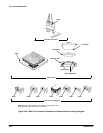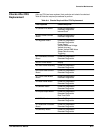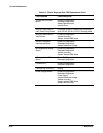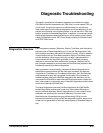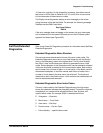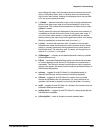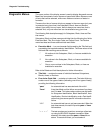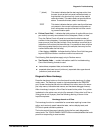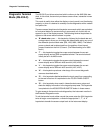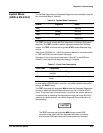
Diagnostic Troubleshooting
Maintenance
6Ć80
Kernel diagnostics are executed each time the front panel ON/STANDBY
switch is set to ON. The CSA 803A performs powerĆon diagnostics on its
microprocessor subsystems and SelfĆTest diagnostics on all of its major
circuits.
When Kernel diagnostics begin, the messages Diagnostics in Progress
and Comm Test in Progress are displayed. If the CSA 803A is poweredĆon
from a cold condition, then the diagnostics may complete before the CRT is
warmed up and able to display these messages.
Diagnostic routines are performed in parallel on each of the instrument's
processor subsystems: Display, Executive, Time Base, and Acquisition.
Following successful execution of their Kernel diagnostics, the Acquisition
processor attempts to communicate with the Time Base processor and the
Time Base and Display processors attempt to communicate with the ExecuĆ
tive processor.
The Executive processor will continue SelfĆTest diagnostics even if it is the
only processor that has successfully completed its Kernel diagnostics.
In the case where the Display processor has not communicated successfully
with the Executive processor, the message indicating that SelfĆTest diagnosĆ
tics are beginning will not appear on the screen. Kernel diagnostic failures
may be indicated by the message, Dsy Kernel Failure,orComm Test in
Progress on the screen and/or a single highĆlow beep and illuminated
menu buttons.
If either the Display, Time Base, or Acquisition processors do not successfulĆ
ly pass their communications stage, then the CSA 803A automatically enters
Extended Diagnostics at the end of the SelfĆTest diagnostics. If the Display
processor is at fault, then the Extended Diagnostic menu will not appear on
the screen.
The Kernel diagnostic tests execute concurrently in all three subsystem
processor circuits at powerĆon. Hardware critical to diagnostic operation is
verified, such as ROM, RAM, DMAs, timers, and interrupt control circuitry.
For the Executive Processor, this requires checking basic operation for most
boards in the card cage (that is, those boards plugged in to the A13 Mother
board). The last step of Kernel diagnostics for the Display, Time Base, and
Acquisition processors is to verify communication. Within each processor, all
Kernel diagnostics must execute without failures before the SelfĆTest diagĆ
nostics can execute. However, the Executive processor continues with its
SelfĆTest diagnostics despite a communication failure encountered with the
Display and/or Time Base processors; additionally, the Time Base processor
does not halt when it has a communication failure with the Acquisition
processor.
Since the condition of the instrument is unknown at powerĆon, when a kernel
failure occurs, Kernel diagnostics in the Executive, Time Base, and AcquisiĆ
tion processors do not attempt to display error index codes. Instead, these
processors generate hexidecimal (hex) numbers that are read as a series of
binary bits, such as XXX1 0101 (hex error code 15
hex
) for the Executive
processor, 0100 (hex error code 4
hex
) for the Time Base processor, or
Kernel Diagnostics





